The Australian Small Business AI Report 2025
In 2025, 80% of small businesses are either using or planning to adopt AI, signalling a shift from “nice-to-have” to “must-have.” To better understand this trend, BizCover has developed the Australian Small Business Report 2025 by surveying 965 small business owners across the country, uncovering insights into how AI is being used, what skills are in demand and how business owners feel about the future of AI in their workplaces.
As a longstanding supporter of Aussie small businesses, BizCover is committed to helping business owners navigate change with confidence. This report dives into how AI is reshaping operations, enhancing productivity and redefining human roles, providing a practical snapshot of where small businesses currently stand in Australia’s AI evolution.
“This latest BizCover report is highly relevant for SMEs in 2025,” says Sharon Kenny, Head of Marketing at BizCover. “Whether AI is already deeply entrenched in your business or you’re wondering just where to start, this data provides a snapshot of how small business owners in Australia from a variety of industries are how using – or planning to use – AI.”
Wondering how small businesses in your sector think about and use AI? We’ve released sector-specific reports for Health, Consulting, Marketing, ICT, Accounting, Architecture, and Retail.
The Australian Small Business AI Report: Key takeaways
- AI is becoming the norm: 80% of small businesses are adopting or planning to adopt AI in the next six months to two years.
- Marketing leads the way: AI adoption varies between industries, with marketing at 91% and health at 51%.
- AI – Why and why not: Small businesses are using AI for problem-solving, marketing, and client communication. Uncertainty about integration and privacy concerns are the main barriers to AI adoption.
- AI importance: 48% of small businesses see AI as important to daily operations, with 14% considering it essential.
- Human skills still matter: Despite AI uptake, core skills like communication and critical thinking remain essential. 49% of respondents worry AI could harm creative abilities like copywriting and content creation.
- AI and job roles: Two thirds of business owners believe that AI could replace some element of human work.
- AI optimism: 60% of small business owners are optimistic about AI’s potential for growth and efficiency.
Small business AI adoption: Current usage and trends
AI adoption among Australian small businesses has officially reached a tipping point. According to our survey, 66% of small business owners already use AI some or all of the time. An additional 14% are planning to adopt it within the next six months to two years. This brings the total figure for current use or intent to use to 80%.
Small businesses that are hesitant about AI are now in the minority. Just one in five small businesses say they have no plans to use AI, which signals a major shift in mindset. Reluctance around using AI in day-to-day operations is falling as the technology landscape in Australia continues to evolve and small businesses find new ways to remain competitive and profitable.
This transformation isn’t limited to tech-focused industries, either. The high adoption rate spans a wide range of sectors, from hospitality and retail to professional services, showing that AI is being embraced as a valuable tool across the board.
“Small businesses are incredibly resourceful, and we’re seeing them use AI in smart, practical ways to save time, improve service and stay competitive,” says Kenny. “The momentum we’re seeing in 2025 shows that AI has become more accessible and relevant, even for businesses that previously felt it was out of reach.” 
AI adoption across key small business sectors
It’s not just tech-focused businesses that are adopting AI. Our survey revealed that between 68% and 97% of respondents (depending on their industry) are either already using AI or planning to do so in the near future. In fact, five out of seven industries show over 80% adoption or intent, highlighting just how widespread interest in AI has become.
91% of marketing businesses answered that yes, they are either using AI some of the time or all of the time. Information technology businesses stood at 83% with consulting companies following with 79%.
The healthcare industry has the lowest rate of AI adoption, with only 51% of businesses revealing that they use AI some or all of the time. More notably, 32% of those in healthcare say they have no plans to use AI, the highest resistance rate across all sectors.
This reluctance to incorporate AI into daily operations could be due to the incredibly sensitive nature of the data and information that healthcare businesses deal with regularly. While all customer information and data should be protected properly, healthcare data tends to include highly sensitive medical information that can be exploited if it falls into the wrong hands. This can have serious consequences for patients, let alone the businesses responsible for the data.
“All small businesses, regardless of industry, should be conscious of the way they use AI and customer information,” points out Kenny. “However, this doesn’t mean that businesses should be too afraid to even begin experimenting with AI and new technology.”
She continues, “There are so many new and exciting opportunities out there when it comes to AI. Businesses can’t afford to be left behind, which is why we’re releasing additional industry-specific reports that offer further insights at a granular level very shortly.”
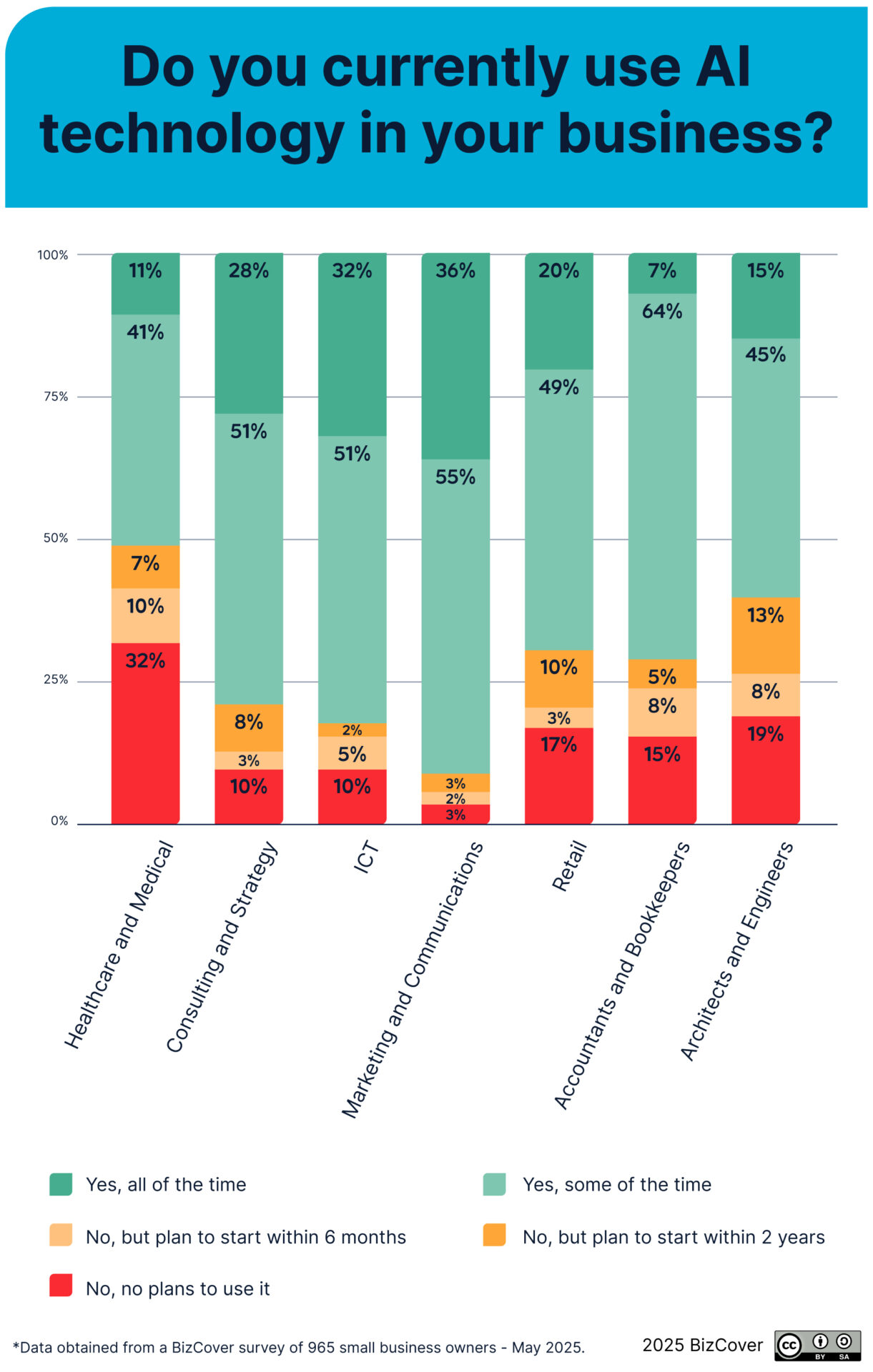
AI’s role in today’s operations
Technology moves at an astounding pace these days. While AI is not a new concept, it’s doubtful that most small business owners just ten or even five years would have believed AI would become a practical part of their day-to-day operations.
62% of small business owners surveyed said that AI is important to how they work, with 35% describing it as “very important” or “absolutely essential.” From automating admin tasks to powering customer service chatbots, AI is helping business owners save time and operate more efficiently.
However, there are still many businesses that have yet to fully embrace AI. 38% still consider it “not very” or “not at all important” to their daily activities, showing there’s still room for growth in how AI is being used and integrated.
Looking ahead, most small business owners are optimistic about AI’s potential. Only 14% believe it will have little to no impact, while a significant 70% expect AI to significantly improve productivity or enhance the services they offer.
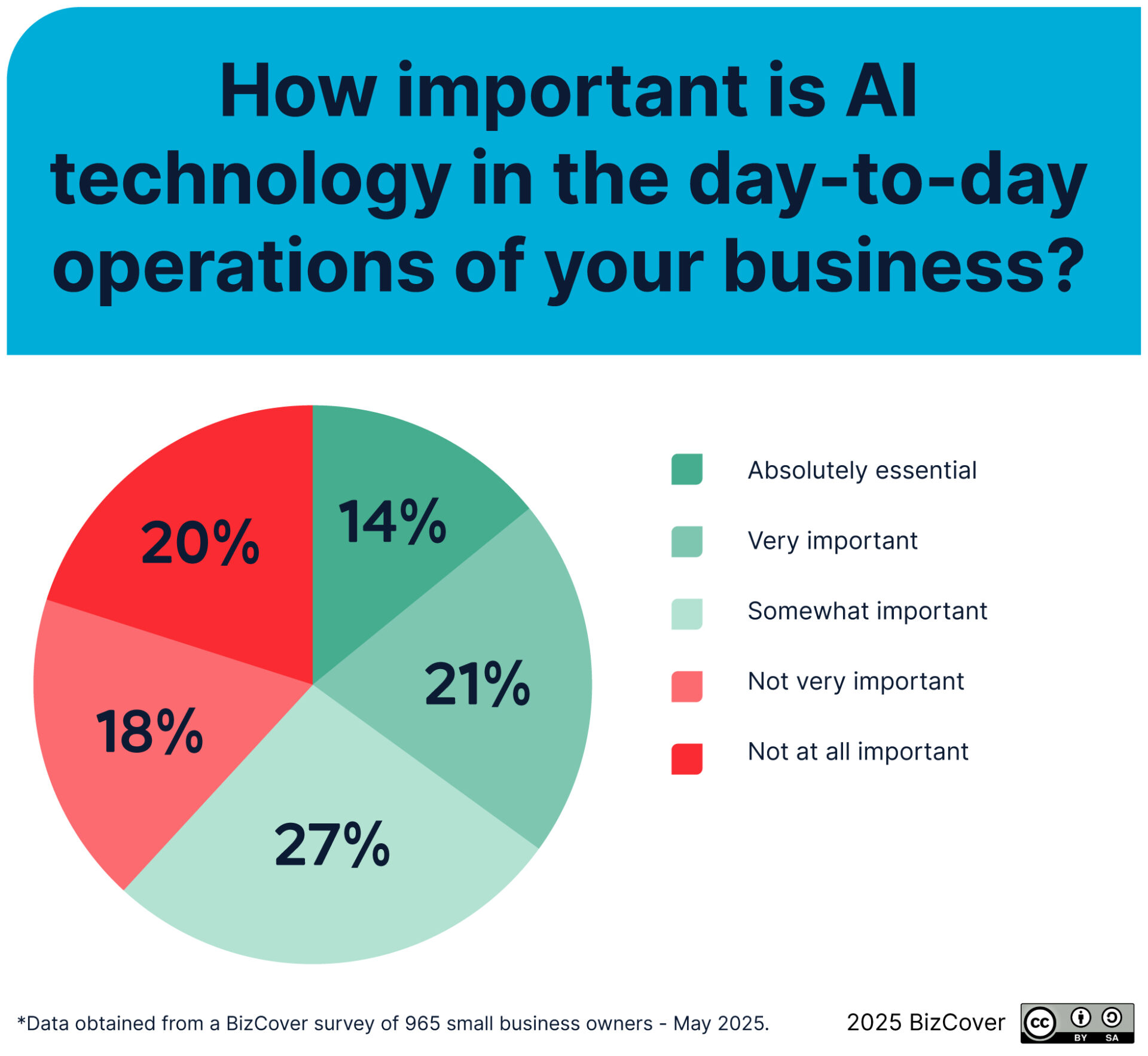
Why small businesses are turning to AI
Our research shows that small businesses are using AI in various ways to save time, boost growth and cut costs. The most commonly selected uses of AI are for problem-solving and assistance, followed closely by marketing and content creation, and client communications.
“What this shows is that many small businesses are using AI not just as a tool that can help automate tasks and save time, but as a collaborative creative partner that can help them make smarter decisions, connect with customers more effectively and stay agile in a competitive landscape,” says Kenny.
What’s holding others back from using AI?
Among small business owners who aren’t yet using AI, the hesitation isn’t rooted in fear of an AI global takeover. Instead, the most commonly cited reason is not knowing how AI works or how to use it. Other top concerns include AI not seeming relevant to their business needs and privacy, security or ethical concerns.
Conversely, “waiting to see how AI evolves” was also a frequent response. This indicates that while business owners are curious about AI, they are also waiting for clearer guidance or reassurance before jumping on the bandwagon.
This suggests that hesitation around AI usage is more about uncertainty than resistance.
Notably absent from the top concerns are cost and concern over job losses. These perceived threats are often thought to be the main barriers for small business owners, but our research results show that these are not the biggest concerns for SMEs.
These answers reveal a key insight – small businesses are open to AI, but they need more clarity, education and industry-specific use cases to feel confident adopting it.
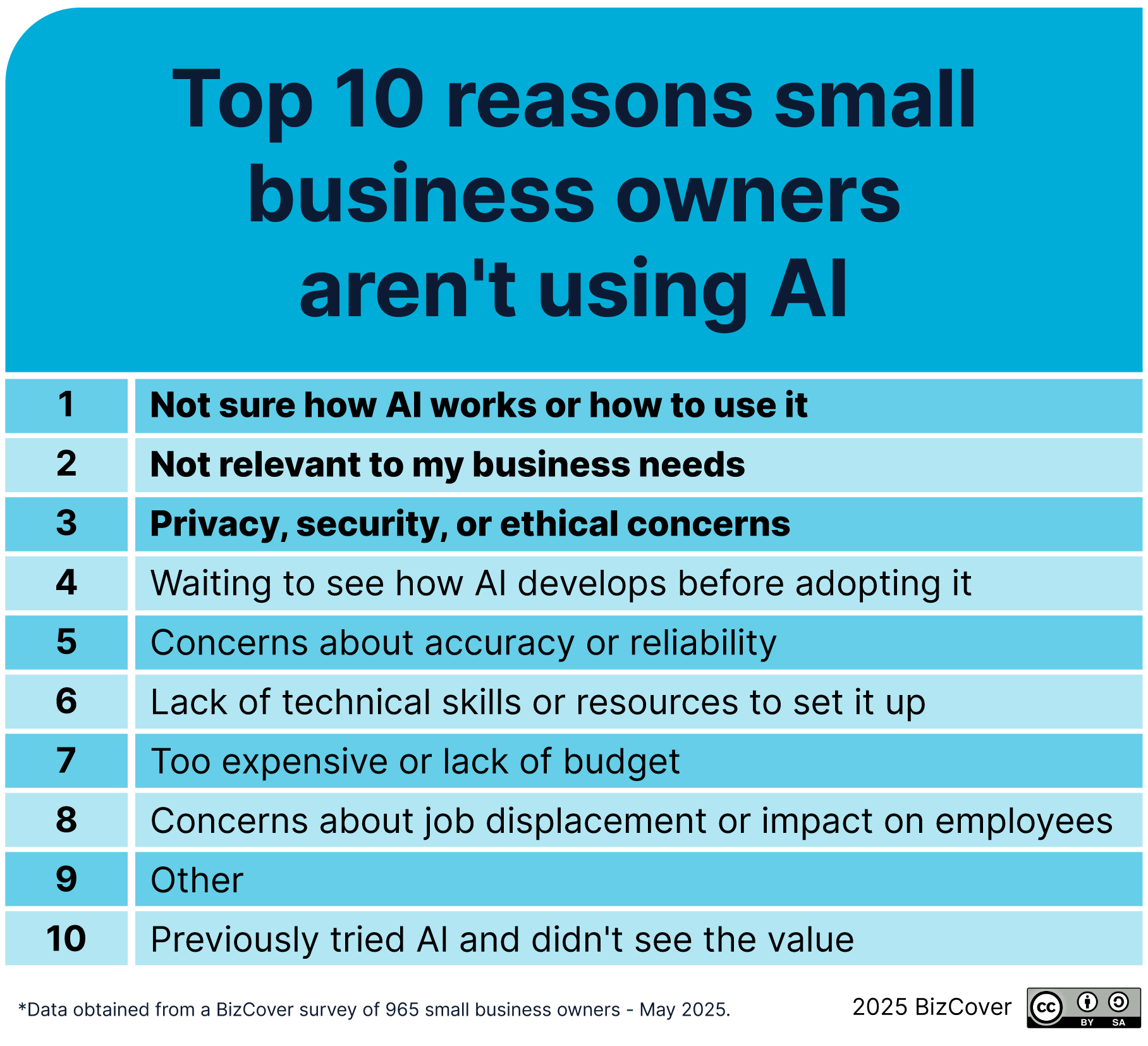
The skills revolution: How AI is shaping talent needs
AI is reshaping the way business owners think about talent acquisition and retention. As small business owners begin to integrate AI into their operations, they’re also considering the kind of skills and talent they’ll need from employees in the future.
According to BizCover’s research, the most sought-after skill in small businesses is communication. This is followed by problem-solving and critical thinking. These three most common skills highlight the importance of relationship building, adaptability, and agility when it comes to responding to challenges.
When asked, “What new skills, if any, are you or your employees learning to stay competitive in your business?” respondents answered that the top skill was creativity and innovation. Communication and AI, automation and data analytics followed closely behind. While more traditional skills like creative thinking and communication are still highly valued, AI, automation and data analytics are quickly gaining traction. This suggests that many business owners see the value in traditional skills, but that upskilling in AI-focused areas may help them to remain competitive.
Interestingly, many of these same skills, particularly problem-solving and communications, also rank among the top tasks that small business owners use AI for (as noted earlier).
“I don’t think small business owners are looking to fully replace human skills,” Kenny says, “but are looking for ways to enhance them. This data shows that rather than using AI for simple automation, SMEs are applying it to amplify the human strengths they already depend on.”
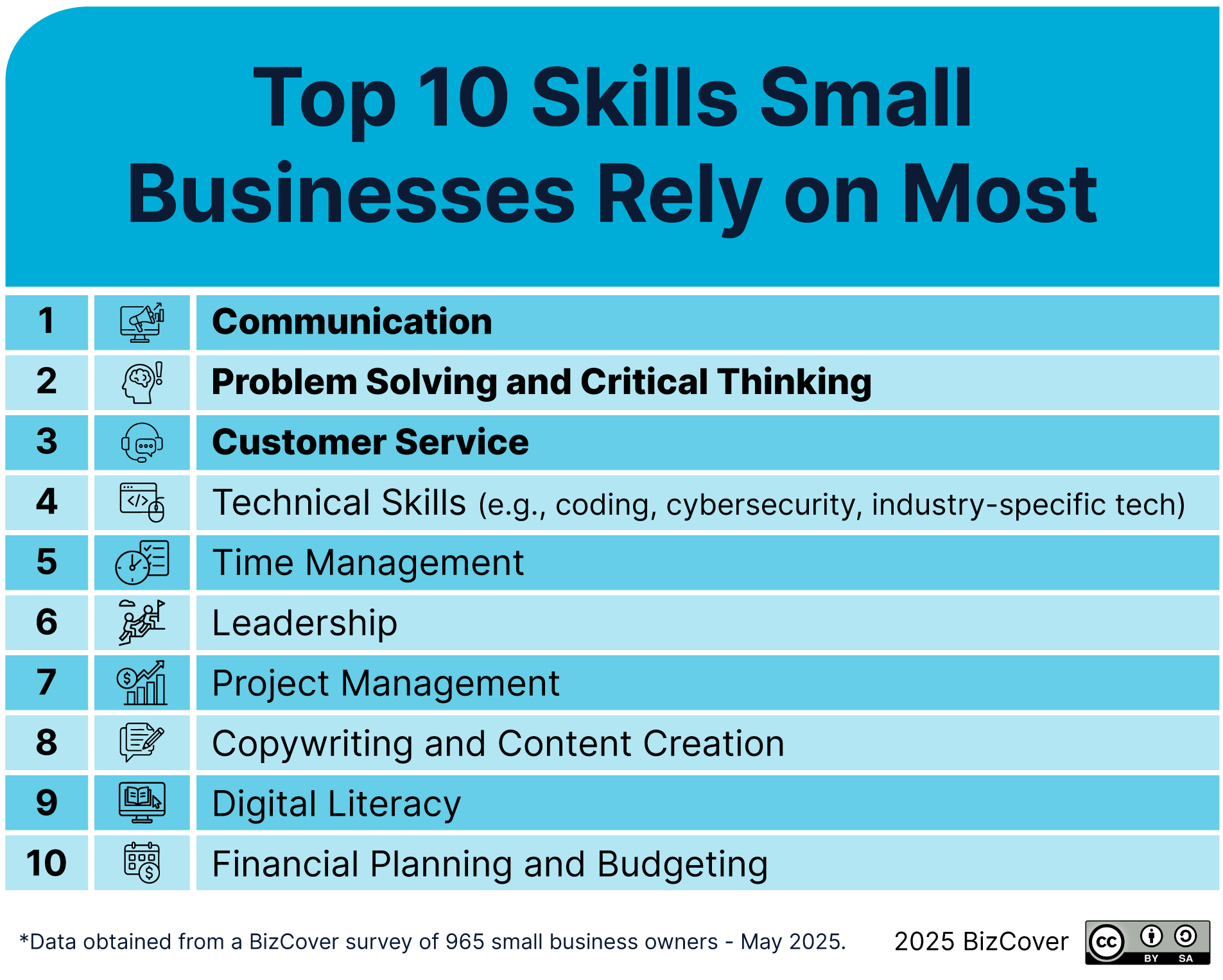
AI’s impact on essential skills is a balancing act
Given the reliance on communication, problem-solving and critical thinking, it’s interesting to note that AI’s impact on these skills is primarily seen as positive by small business owners. For example, 42% believe AI will improve problem-solving and critical thinking skills, while 46% think creativity and innovation will be enhanced by AI.
However, the responses are not without some caution. In areas like copywriting and content creation, almost half (49%) believe AI will negatively impact these human skills. There is also concern around data analysis and interpretation, with 46% believing this area will also be negatively impacted. This shines a light on a complex relationship: while AI is recognised as an efficient tool for automating tasks, there’s a clear concern about it eroding the quality of creative, interpersonal and decision-making capabilities.
This dynamic highlights that while AI can enhance certain aspects of human skill, small business owners are mindful of the need to maintain human-driven qualities that differentiate them in a competitive market.
AI is changing the skills landscape
Nearly one in three small businesses struggle to find skilled workers with both hard and soft skills. Out of the two, business owners believe that it’s harder to find workers with soft skills (24%) than those with hard skills (20%). In comparison, one in four Aussie businesses say they have not been held back by any skills shortages.
But when asked “How do you see AI changing the skillsets required for businesses in the next 3-5 years?” only 8% stated they expected no change whatsoever. In fact, with 48% of small businesses expecting AI to reduce the need for some current skills, and another 48% anticipating demand for entirely new ones, the pressure to adapt is growing.
This shifting landscape makes it essential for small businesses to invest in upskilling and rethink talent strategies to stay competitive in the era of AI. Rather than resisting change, businesses that evolve alongside AI may be better positioned to thrive.

Will AI replace people? The answer is: It depends
In Kenny’s opinion: “Small business owners recognise AI’s potential, but most are applying it practically, not radically. They’re using it to reduce workload, not headcount.”
The question of whether AI will replace people is one of the most talked-about issues in the wider AI conversation. Among small business owners, opinions are split: 65% believe AI could replace at least some human functions in their business.
However, it appears that most are just talking about certain tasks, not entire job roles. Only 13% of business owners believe it could fully replace both tasks and jobs.
What this shows us is that belief doesn’t always align with behaviour. Just because some business owners believe AI could replace a person doesn’t always mean they would choose that route. While 46% of business owners would consider using AI instead of hiring or outsourcing, only 16% say they would actively choose AI over a human. On the flip side, 18% firmly reject the idea of ever replacing a person with AI.
That said, industry perspectives vary widely. In ICT, where AI tools are more familiar, 75% believe AI could replace some employee needs, the highest of any sector. But in healthcare, 42% say AI cannot replace tasks or roles. This highlights the value placed on human care, knowledge and expertise in this sector.
The bottom line? Small businesses see AI as a complement, not a complete substitute for human input. Especially in roles that require empathy, judgment, or creativity.

Small businesses want AI to replace routine tasks, but not everything
The most common task that business owners believe could be replaced in their business is marketing and content creation, followed by admin tasks (such as scheduling, data entry, etc) and then data analysis and reporting. This shows a strong overlap between the tasks that small businesses believe AI could take over and the ones they’re already using AI for.
The top five tasks that business owners are already using AI for include problem-solving, marketing, content creation, admin assistance, data analysis and communications. This proves that many business owners aren’t just speculating about AI – they’re already putting it to the test.
But there are some skills that seem to remain irreplaceable. Problem-solving and ideation, while currently the most common use of AI, doesn’t appear in the top 10 for replacement. This suggests that while AI is welcome as a thinking partner, business owners still want the final say when it comes to judgment, innovation, and strategic decisions.
This data paints an interesting and juxtaposing picture. While business owners believe there will be negative impacts on human skills related to copywriting, content creation and data analysis, they are still willing to use AI for these tasks. Comparatively, 46% of business owners believe that AI will have a positive effect on creativity and innovation – but they are not willing to replace those tasks within their business just yet.
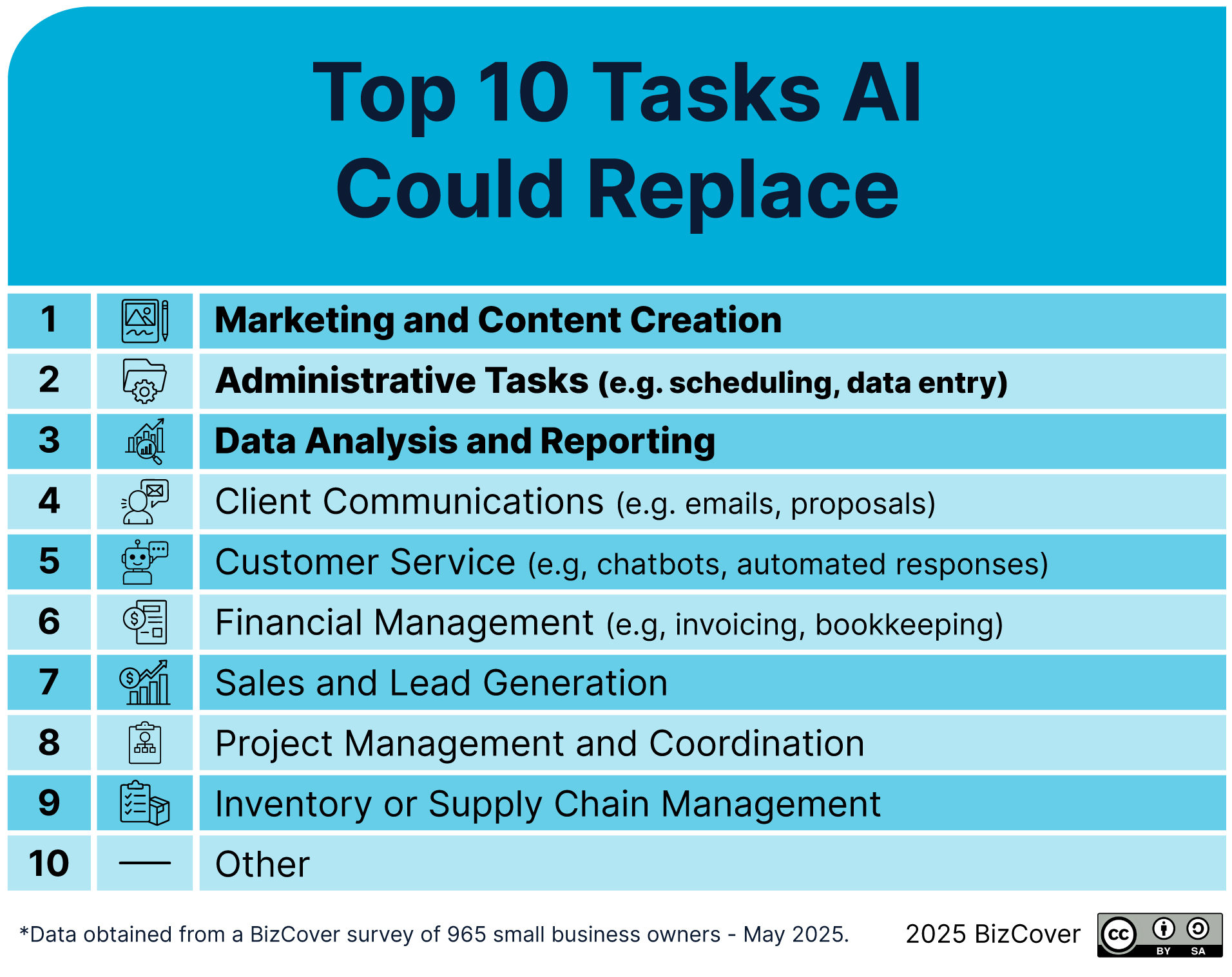
Embracing AI: What does the future look like for small business owners?
Overall, it seems that small businesses are more than willing to embrace AI and only 12% of respondents feel at risk of their skills become less relevant or entirely obsolete. The majority (60%) are positive and see opportunities for growth. In contrast, almost one third (28%) of business owners are neutral and do not expect much impact on their work.
These findings highlight a mixed landscape. While the majority are optimistic, a smaller group remain concerned for the future. This could also reflect the common beliefs in certain industries, as well. The most optimistic sectors include IT and marketing, where 75% of respondents feel positive about AI’s impact on their skills and career, followed by consulting (73%). The most negative industries are architects, where 19% of respondents feel negative or very negative about the future.
“The general sentiment suggests a willingness among small business owners to embrace change and view AI as an enabler rather than a threat,” says Kenny. “The focus is shifting from anxiety to adaptability. They’re leaning into the opportunities AI brings to upskill, streamline and stay competitive.”
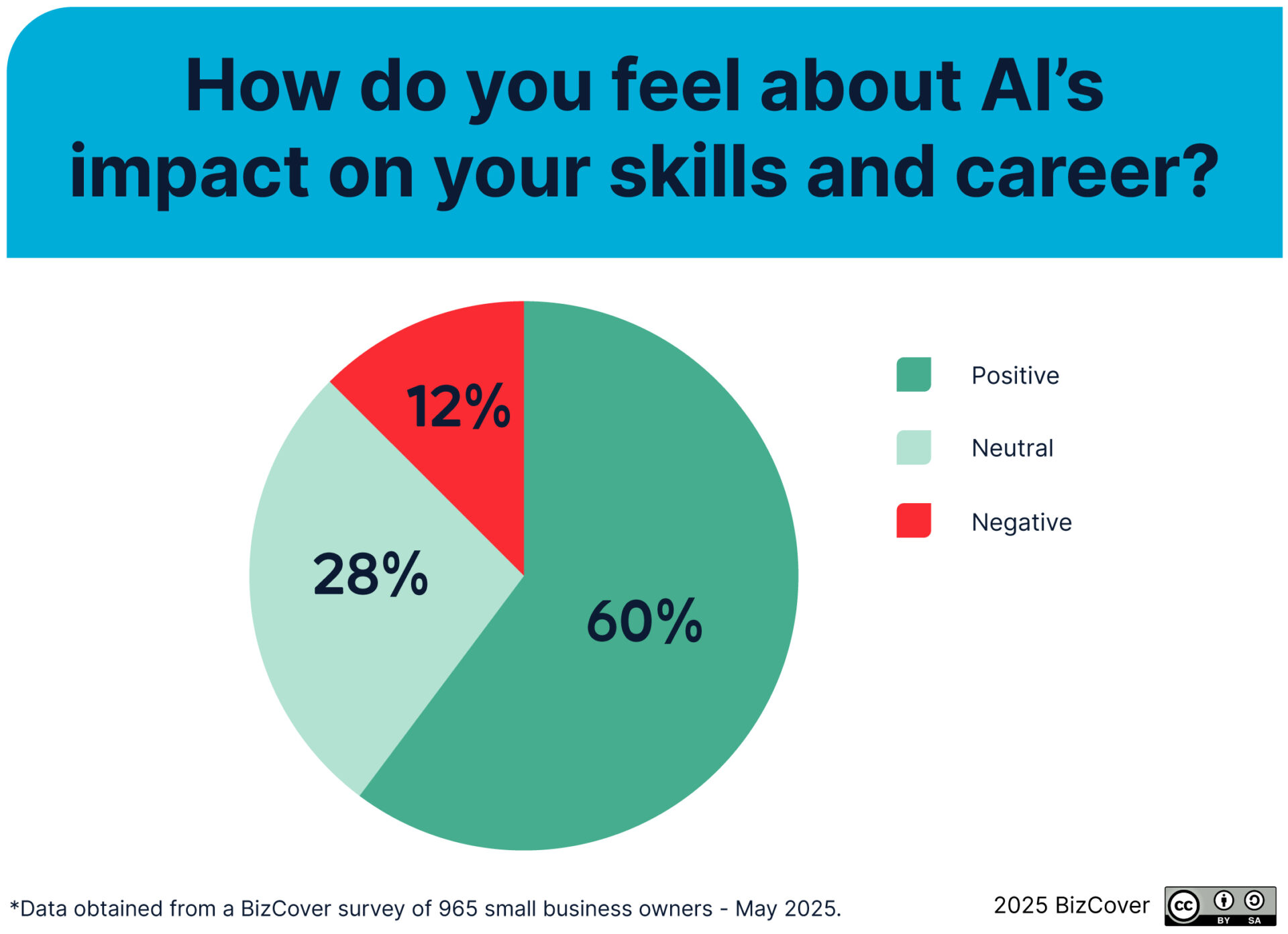
Conclusion
As the data shows, AI is very quickly becoming an integral tool for small businesses in Australia. With 80% of business owners either using or planning to adopt AI in the next two years, it’s clear that the technology is becoming an essential part of doing business.
However, it is important to note that there are still barriers to adoption and hurdles to overcome. Concerns around privacy, ethics and skill obsoleteness exist, and a small cohort of business owners have limited access to information about AI. There are also concerns around AI replacing human creative thinking and decision-making.
In industries like marketing and consulting, AI is already deeply embedded. But business owners remain cautious about handing over creative and strategic tasks, showing a strong preference for balancing AI support with human oversight.
Kenny believes that “As AI evolves, so too will the Australian workforce.” She continues, “But overall, the outlook remains optimistic as small business owners explore how to best integrate AI while preserving what makes their businesses unique and, of course, human.”
Methodology
This research was conducted via an online survey distributed to Australian business owners in April 2025. A total of 1,323 responses were collected. For the purposes of this analysis, only responses from small business owners (defined as those with 20 or fewer employees) were included, bringing the final sample size to 965.
These respondents represented seven industries, after excluding two industries with low response rates (fewer than 50 responses each) to ensure meaningful comparison. The remaining industries include Marketing and Communications, Consulting and Strategy, ICT, Healthcare and Medical, and others.
Respondents were asked a mix of multiple choice and checkbox questions covering AI adoption, its impact on operations and roles, and evolving skill requirements. The data has been analysed to highlight trends across small business owners, industries, and anticipated future use of AI in the small business sector.
This information is general only and does not take into account your objectives, financial situation or needs. It should not be relied upon as advice. As with any insurance, cover will be subject to the terms, conditions and exclusions contained in the policy wording.
© 2025 BizCover Pty Limited, all rights reserved. ABN 68 127 707 975; AFSL 501769
This information is general only and does not take into account your objectives, financial situation or needs. It should not be relied upon as advice. As with any insurance, cover will be subject to the terms, conditions and exclusions contained in the policy wording or Product Disclosure Statement (available on our website). Please consider whether the advice is suitable for you before proceeding with any purchase. Target Market Determination document is also available (as applicable). © 2026 BizCover Pty Limited, all rights reserved. ABN 68 127 707 975; AFSL 501769.

![[Press Release] BizCover Shortlisted for 4 Excellence Awards by Insurance Business Australia in 2026](https://www.bizcover.com.au/wp-content/uploads/Press-Release-BizCover-Shortlisted-for-4-Excellence-Awards-by-Insurance-Business-Australia-in-2026.jpg)

![[Press Release] Extreme weather poses growing threat to Australian businesses as storm and fire season approach](https://www.bizcover.com.au/wp-content/uploads/Press-Release-Extreme-weather-poses-growing-threat-to-Australian-businesses-as-storm-and-fire-season-approach-1.jpg)